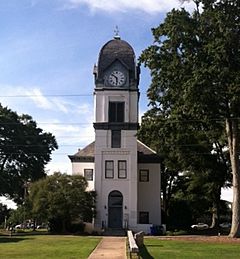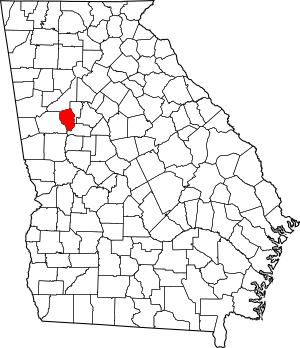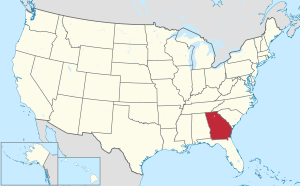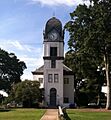Fayette County, Georgia facts for kids
Quick facts for kids
Fayette County
|
|||
|---|---|---|---|

Fayette County Courthouse, in Fayetteville
|
|||
|
|||

Location within the U.S. state of Georgia
|
|||
 Georgia's location within the U.S. |
|||
| Country | |||
| State | |||
| Founded | May 15, 1821 | ||
| Named for | Marquis de Lafayette | ||
| Seat | Fayetteville | ||
| Largest city | Peachtree City | ||
| Area | |||
| • Total | 199 sq mi (520 km2) | ||
| • Land | 194 sq mi (500 km2) | ||
| • Water | 5.0 sq mi (13 km2) 2.5%% | ||
| Population
(2020)
|
|||
| • Total | 119,194 | ||
| Time zone | UTC−5 (Eastern) | ||
| • Summer (DST) | UTC−4 (EDT) | ||
| Congressional districts | 3rd, 13th | ||
Fayette County (pronounced FAY-ət) is a county in the central part of Georgia, USA. In 2020, about 119,194 people lived here. This was more than the 106,567 people counted in 2010.
Fayette County was created in 1821. Its main town, called the county seat, is Fayetteville. Fayetteville was started in 1823. A big part of Fayette County is next to the Flint River on its east side.
The county was named after the Marquis de Lafayette. He was a French nobleman who helped General George Washington during the American Revolutionary War.
Since the late 1900s, Fayette County has become part of the larger Atlanta area. It is south of Atlanta and close to Hartsfield-Jackson International Airport. Because it's a suburb of Atlanta, Fayette County has grown a lot. Its population has almost doubled since 1990.
Contents
History of Fayette County
Fayette County was formed on May 15, 1821. This happened after the United States made a deal with the Creek people. The Creek people had lived in this area for a long time. They agreed to give up a large part of their land.
The county and its main town, Fayetteville, were both named to honor the Marquis de Lafayette. He was a French hero who helped America win the American Revolutionary War.
After World War II, more people started moving to Fayette County. They built homes and commuted to jobs in Atlanta. Peachtree City was started in 1959. It was planned out carefully and covers 16,000 acres. It's the only planned community in the county.
The county's population has grown very quickly. Many people have moved here for new jobs and chances. This growth and development are still happening today.
In 2002, Charles "Chuck" Floyd became the Chief Magistrate Judge. He was later elected to this job in 2004 and 2008. He was the first African American person ever elected to any office in Fayette County.
Geography of Fayette County
Fayette County covers about 199 square miles. Most of this is land (194 square miles), and a small part is water (5 square miles).
The Flint River flows through the county. In the past, this river was important for moving goods and crops. All of Fayette County is in the Upper Flint River area.
Main Roads in Fayette County
 State Route 54
State Route 54 State Route 74
State Route 74 State Route 85
State Route 85 State Route 92
State Route 92 State Route 138
State Route 138 State Route 279
State Route 279 State Route 314
State Route 314
Neighboring Counties
- Fulton County – to the north
- Clayton County – to the east
- Spalding County – to the south
- Coweta County – to the west
Towns and Cities
In 2015, Fayetteville elected its first African-American mayor, Ed Johnson. He was known for bringing people together. Johnson was a retired naval commander and a pastor. He was first elected to the city council in 2011.
Cities
- Fayetteville (This is the county seat, or main town)
- Peachtree City (This is the largest city in the county)
Towns
Other Communities
- Inman
- Starr's Mill
People of Fayette County
| Historical population | |||
|---|---|---|---|
| Census | Pop. | %± | |
| 1830 | 5,504 | — | |
| 1840 | 6,191 | 12.5% | |
| 1850 | 8,709 | 40.7% | |
| 1860 | 7,047 | −19.1% | |
| 1870 | 8,221 | 16.7% | |
| 1880 | 8,605 | 4.7% | |
| 1890 | 8,728 | 1.4% | |
| 1900 | 10,114 | 15.9% | |
| 1910 | 10,966 | 8.4% | |
| 1920 | 11,396 | 3.9% | |
| 1930 | 8,665 | −24.0% | |
| 1940 | 8,170 | −5.7% | |
| 1950 | 7,978 | −2.4% | |
| 1960 | 8,199 | 2.8% | |
| 1970 | 11,364 | 38.6% | |
| 1980 | 29,043 | 155.6% | |
| 1990 | 62,415 | 114.9% | |
| 2000 | 91,263 | 46.2% | |
| 2010 | 106,567 | 16.8% | |
| 2020 | 119,194 | 11.8% | |
| 2023 (est.) | 123,351 | 15.7% | |
| U.S. Decennial Census 1790-1880 1890-1910 1920-1930 1930-1940 1940-1950 1960-1980 1980-2000 2010 2020 |
|||
| Race | Number of People | Percentage |
|---|---|---|
| White | 68,144 | 65% |
| Black or African American | 29,166 | 26.7% |
| Native American | 212 | 0.18% |
| Asian | 6,362 | 5.34% |
| Pacific Islander | 44 | 0.04% |
| Other/mixed | 5,786 | 4.85% |
| Hispanic or Latino | 9,480 | 7.95% |
In 2020, there were 119,194 people living in Fayette County. These people made up 41,253 households and 33,101 families.
In 2010, the average income for a household in the county was $82,216. For families, the average income was $92,976. A small number of families and people lived below the poverty line. This included about 6.1% of those under 18 years old.
Education in Fayette County
The Fayette County School System takes care of education here. Five elected people make up the Fayette County Board of Education. They hire a superintendent to manage the schools every day.
Since 2016, the school board members are each elected from their own areas. This means each area chooses its own representative for the board.
High Schools
- Fayette County High School
- McIntosh High School
- Sandy Creek High School
- Starr's Mill High School
- Whitewater High School
Other Schools
- Fayette County Alternative Education Program
Famous People from Fayette County
Many interesting people have come from Fayette County! Here are a few:
- Paris Bennett, a singer
- Furman Bisher, a sports writer for the Atlanta Journal-Constitution
- Robert H. Brooks, who used to lead Hooter's of America Inc.
- Zac Brown, a Grammy award-winning singer from the Zac Brown Band
- Robert J Burch, a children's author
- Kandi Burruss, a singer and reality TV star
- Mike Duke, who used to be the CEO of Wal-Mart Stores Inc.
- Lee Haney, a retired professional bodybuilder and Mr. Olympia winner
- Evander Holyfield, a retired professional boxer
- Tim Hudson, a former baseball pitcher for the Atlanta Braves
- Calvin Johnson, a former NFL football player for the Detroit Lions
- Emmanuel Lewis, an actor from the TV show Webster
- Carole Marsh, a children's author and founder of Gallopade International
- Kelley O'Hara, a United States Women's Soccer Player and Olympic gold medalist
- Paul Orndorff, a professional wrestler
- Ferrol Sams, a doctor, humorist, and best-selling writer
- Reed Sorenson, a NASCAR race car driver
- Christian Taylor, an Olympic gold medalist in triple jump
- Gy Waldron, the creator of The Dukes of Hazzard TV show
- John Waller, a contemporary Christian singer
Images for kids
See also
 In Spanish: Condado de Fayette (Georgia) para niños
In Spanish: Condado de Fayette (Georgia) para niños
 | Jewel Prestage |
 | Ella Baker |
 | Fannie Lou Hamer |






